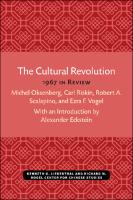The Cultural Revolution
1967 in Review
Author(s)
Oksenberg, Michel
Riskin, Carl
Scalapino, Robt
Vogel, Ezra F.
Vogel, Ezra
Language
EnglishAbstract
The Chinese Communist system was from its very inception based on an inherent contradiction and tension, and the Cultural Revolution is the latest and most violent manifestation of that contradiction. Built into the very structure of the system was an inner conflict between the desiderata, the imperatives, and the requirements that technocratic modernization on the one hand and Maoist values and strategy on the other. The Cultural Revolution collects four papers prepared for a research conference on the topic convened by the University of Michigan Center for Chinese Studies in March 1968. Michel Oksenberg opens the volume by examining the impact of the Cultural Revolution on occupational groups including peasants, industrial managers and workers, intellectuals, students, party and government officials, and the military. Carl Riskin is concerned with the economic effects of the revolution, taking up production trends in agriculture and industry, movements in foreign trade, and implications of Masoist economic policies for China’s economic growth. Robert A. Scalapino turns to China’s foreign policy behavior during this period, arguing that Chinese Communists in general, and Mao in particular, formed foreign policy with a curious combination of cosmic, utopian internationalism and practical ethnocentrism rooted both in Chinese tradition and Communist experience. Ezra F. Vogel closes the volume by exploring the structure of the conflict, the struggles between factions, and the character of those factions.
Keywords
Sociology and anthropologyDOI
10.3998/mpub.20002Publisher
University of Michigan PressPublisher website
https://www.press.umich.edu/Publication date and place
Ann Arbor, 2020Grantor
Imprint
U OF M CENTER FOR CHINESE STUDIESSeries
Michigan Monographs In Chinese Studies, 2Classification
Sociology and anthropology


 Download
Download